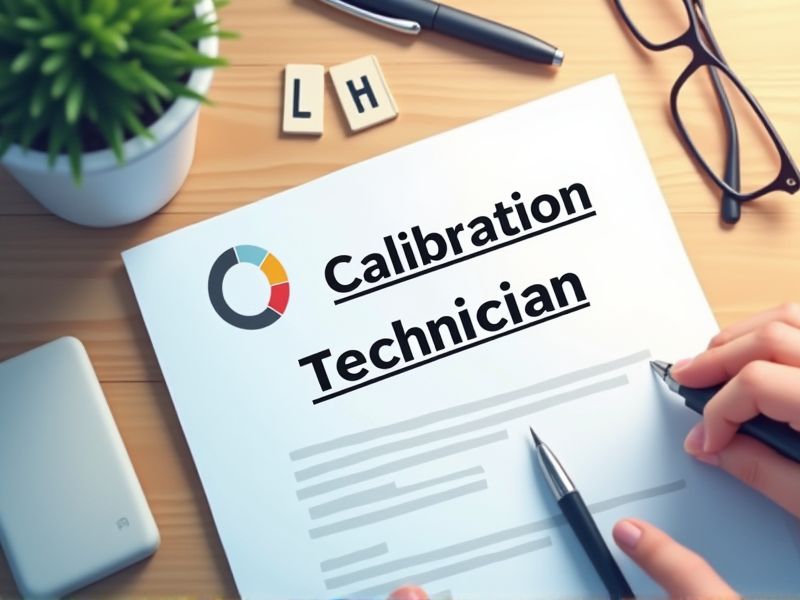
Calibration Technicians ensure precise measurements, which is critical in maintaining equipment accuracy. Industries rely on their expertise to comply with quality standards and regulatory requirements. Achieving certain certifications demonstrates their proficiency and commitment to their field. Here are some key certifications you may need as a Calibration Technician.
Certified Calibration Technician (CCT)
Certified Calibration Technicians are essential for ensuring the accuracy and precision of measurement tools and equipment, which directly affects product quality and safety. Their certification signifies a verified understanding of calibration methods and industry standards, leading to reduced errors and rework. Employing certified technicians can enhance a company's credibility with clients and stakeholders by demonstrating a commitment to reliable processes. A CCT also stays updated with the latest technologies and practices, fostering innovation and compliance in calibration activities.
ISO/IEC 17025 Laboratory Accreditation Training
Calibration technicians need ISO/IEC 17025 training to ensure they follow international standards in testing and calibration, enhancing reliability. This training improves their ability to identify issues that could affect measurement accuracy, thus reducing errors. Holding this accreditation boosts the laboratory's credibility, fostering client trust. By understanding these standards, technicians contribute to compliance with industry regulations, which can expand business opportunities.
NIST Traceable Calibration Certification
NIST Traceable Calibration Certification provides a standardized reference to ensure measurement accuracy and reliability. Calibration technicians rely on this certification to guarantee that their instruments conform to recognized national standards, directly impacting the consistency of measurements. Regulatory compliance often mandates such certifications to meet industry-specific guidelines, ensuring safety and quality. Data integrity in processes, such as quality control and laboratory analysis, is enhanced when technicians use NIST-traceable instruments.
ASQ Certified Quality Technician (CQT)
Calibration technicians benefit from ASQ Certified Quality Technician (CQT) certification because it provides them with essential skills in quality control processes, which are critical for maintaining precision in calibration tasks. The certification enhances their understanding of statistical methods, making them more effective in analyzing measurement data and ensuring the accuracy of instruments. Employers often prefer certified technicians, as the credential indicates a standard level of expertise and commitment to quality. This certification helps technicians keep up with industry standards and best practices, which is crucial for maintaining regulatory compliance in various sectors.
Six Sigma Yellow Belt Certification
Six Sigma Yellow Belt Certification equips Calibration Technicians with essential problem-solving skills, which enhances their ability to maintain precision in measurements. This certification provides a foundational understanding of process improvement principles, leading to more efficient workflow management. With these skills, technicians can identify and reduce defects, directly improving the reliability of calibration processes. As a result, companies benefit from increased accuracy and reduced operational costs.
Electrical/Electronics Technician Certification
Obtaining an Electrical/Electronics Technician Certification ensures that a Calibration Technician possesses a foundational understanding of electronic systems and components. This knowledge is crucial for accurately calibrating and troubleshooting sophisticated electronic equipment. The certification provides standardized training, which results in consistent and reliable calibration outcomes. Employers often require certification as it indicates a technician's competence in meeting industry standards and safety regulations.
Instrumentation and Control Systems Certification
Certification in Instrumentation and Control Systems ensures that calibration technicians possess up-to-date knowledge of industry standards and best practices. It enhances their competency, reducing the risk of errors during calibration and maintenance processes. Employers gain confidence in certified technicians, leading to improved operational efficiency and reduced downtime. The certification also provides technicians with a competitive edge in the job market, increasing their career advancement opportunities.
OSHA Safety Certification
Calibration technicians often work with complex instruments and potentially hazardous environments; OSHA safety certification enhances their knowledge of workplace safety standards and regulations, reducing the risk of accidents. With certification, technicians are better equipped to identify potential hazards, leading to a safer work environment. Employers prioritize hiring certified technicians, as it signifies a commitment to maintaining safety standards and reducing liability. Compliance with OSHA requirements often results in improved workplace efficiency, as fewer accidents and disruptions occur.
Good Manufacturing Practices (GMP) Certification
GMP certification ensures calibration technicians adhere to stringent industry standards, reducing the risk of equipment malfunction. Compliance with GMP enhances the accuracy and reliability of calibration processes, crucial for maintaining product quality. GMP-certified technicians contribute to consistent manufacturing outcomes, minimizing production downtime and cost implications. Certification fosters trust and credibility with clients and regulatory bodies, impacting business reputation positively.
NFPA 70E Electrical Safety Certification
NFPA 70E Electrical Safety Certification reduces the risk of electrical hazards for calibration technicians by equipping them with knowledge to recognize and mitigate potential dangers. Compliance with this certification ensures adherence to industry standards, which in turn fosters a safer working environment. It enhances the technician's credibility by demonstrating a commitment to security and competence in handling electrical equipment. Employers benefit from reduced liability and the potential for fewer workplace accidents when technicians are properly trained.
Summary
When you gain certifications as a Calibration Technician, your skillset broadens, making you more competitive in the job market. Employers may see an increase in productivity and accuracy in your work, improving overall operational efficiency. With these credentials, you could experience greater job stability and career advancement opportunities. Certification also often translates into higher earning potential, benefiting your financial situation.
